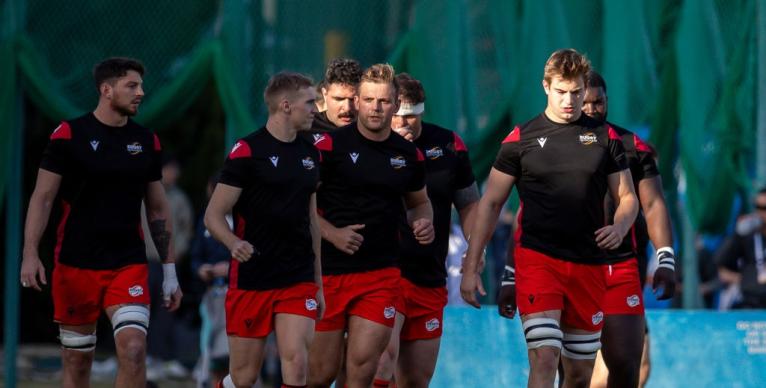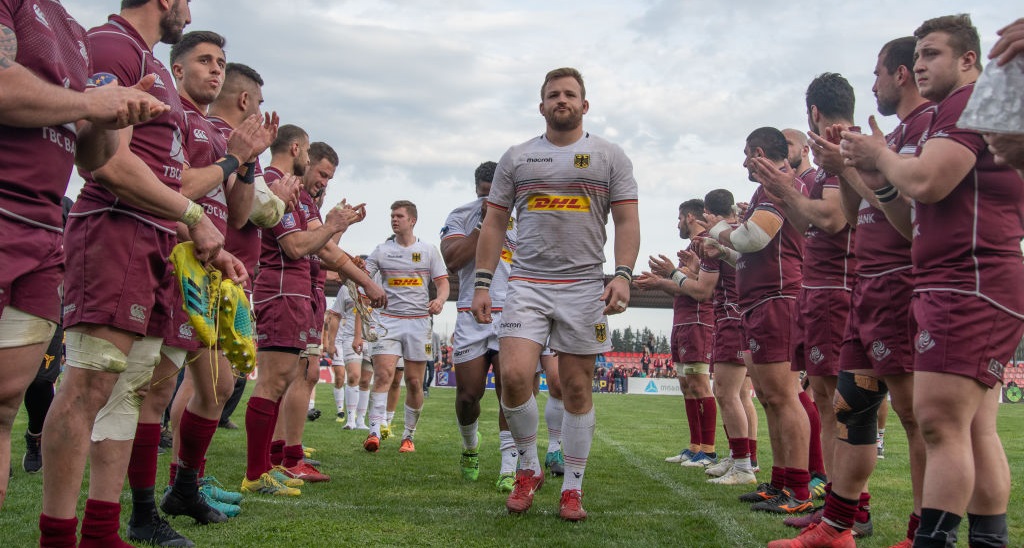Sleeping giants Germany plot path to re-write their rugby history

The next men’s Rugby World Cup is still almost another three years away. But the qualification process for the 11th edition taking place in Australia in 2027 is about to get into full gear. 12 teams have already secured their qualification by virtue of their RWC 2023 finish and another 12 berths are now up for grabs. Four of these will be determined in next year’s Rugby Europe Championship, which is less than three months away. Despite currently only being ranked 32nd in the men’s world ranking, the German Schwarze Adler are hoping to write history and secure their first-ever World Cup appearance.
Just over a year ago, Siya Kolisi lifted the Webb Ellis Cup into the rainy Paris sky on a memorable autumn night. In the months since, the focus has all but shifted to the next edition of rugby’s greatest showcase, but not just for those teams aiming to follow in the Springboks’ footsteps as world champions. A whole host of teams are vying for their Rugby World Cup debut.
For the first time ever, a total of 24 teams will be competing at the upcoming men’s World Cup, up from 20 participants, which had been the norm since the 1999 tournament. The new format makes it much more likely that the coming World Cup will see one or several teams make their first-ever appearance after the four previous editions combined featured only one entirely new team in Chile.
One of the debutants might very well be coming from Europe, as next year’s Rugby Europe Championship will offer four instead of two direct qualification berths for 2027 and one further spot in the global repechage tournament. The repechage will once again determine the last participant in the tournament’s final run-up, as it did for the 2023 World Cup, when Portugal dramatically knocked out the US with an overtime kick for glory.
One of the teams confident that they are in with a real shot are the Schwarze Adler (Black Eagles). The German national team were once previously very close to qualifying for the World Cup in 2019. Back then, the Adler profited from Spain and Romania fielding ineligible players in the qualification process and fortuitously made it to the repechage tournament. There, the Eagles missed out only by a whisker on qualifying for Japan, when Canada proved to be too big of a hurdle after victories against Kenya and Hong Kong had put the German team in contention.

In the years since, the Adler’s fortunes have shifted dramatically. First, the team suffered from billionaire benefactor Hans-Peter Wild, who also happens to be the owner of Paris giants Stade Francais, pulling his funding over a dispute with the German union’s leadership. Not long after, Germany still under coach Mike Ford’s guidance, lost its place in the Rugby Europe Championship due to an agonisingly narrow loss against Portugal in the 2019 promotion-relegation playoff.
The team subsequently went through an entire rebuild, which proved to be very challenging due to severe funding issues and included several setbacks along the way. But it also put an end to the over-reliance on heritage players that had been lured into the national set-up with the help of Wild’s sizeable coffers. In 2022 the Eagles once again profited from another team’s misfortunes, when Russia was banished from all international sporting competitions for launching its invasion of Ukraine.
This gave Germany the chance to re-enter the Rugby Europe Championship (REC) after closely missing out on promotion previously and the Eagles embraced the opportunity. Wins against Poland and Belgium, as well as running the almighty Georgians very close earlier this year, ignited German hopes of making it to Australia in 2027.
With the new qualification format, the path for Germany to qualify is more straightforward than ever. Three rounds of matches next February will determine which four teams will be heading to Australia from the two pools of four that play in the Rugby Europe Championship. Finishing in the top two of pool B in the Rugby Europe Championship would see Germany secure its historic first-ever Rugby World Cup qualification, right when the Union is celebrating the 125th anniversary of its founding in 1900.
In order for the dream to become reality, repeating this year’s away win against Belgium is a must. Albeit this time the Adler will have home-field advantage in the central German city of Kassel, where the German Rugby Federation was founded in 1900. Then Germany needs to pull off an upset either against Romania or Portugal away from home, which will be a much bigger ask. Especially given that the Oaks just recently beat World Cup mainstays Tonga at home during their preparations.
Germany Head Coach Mark Kuhlmann, himself a former Adler captain, is nevertheless cautiously optimistic when discussing the upcoming REC campaign with RugbyPass. “The changes have benefited us and while the path to qualification remains very challenging, it is far from unrealistic!” One away win in Romania or Portugal, both of which Germany have managed to beat in the last eight years, would give Germany a massive chance to seal the deal at home against Belgium.

However, Kuhlmann also warns of a chaotic scenario, where one team comes out on top, winning against everyone else, while the rest of the field have beaten each other. He cites Portugal tripping over Belgium earlier this year and points out that other teams have shown surprising inconsistencies in the past as well. In such a scenario, one win and one further bonus point might suffice to book the direct ticket to the Australia showpiece.
In order to get the German team up to speed, preparations are well underway and will ultimately be the most extensive since the close run-in for the Japan World Cup, despite remaining financial constraints. This November the Germans are playing two preparation matches in England and the United Arab Emirates. Kuhlmann and his coaching staff have to rely mostly on the German-based players this November, as getting foreign professional players released from their professional clubs remains a persistent issue for the Eagles.
The first of Germany’s two November preparation matches was a fixture overloaded with symbolism. The German team took on the UK armed forces selection at Gloucester’s iconic Kingsholm Stadium on November 6th. Merely six months out from the 80-year anniversary of the end of World War II, the German side came to the West Country to play the Armed Force’s annual Remembrance Day fixture.
Representatives for the German Bundeswehr and the UK Armed Forces stood side by side, laying down wreaths in honour of the fallen, while both teams and spectators held a minute of silence. A special and emotional occasion for Eagles captain Jörn Schröder, as he explained in the aftermath of this historic fixture.
When anthem singer Amelia Underwood performed the World in Union during half-time, which has been the official theme song for the Rugby World Cups since 1991, some in the German team read this as a potentially prophetic choice of musical interlude. Kingsholm Stadium, itself a World Cup venue on several occasions, saw an adventurous German side score seven tries in a comprehensive 43-26 victory.
Kuhlmann is very positive about the trajectory of his team and is convinced that the upward trend will continue: “We have made great strides in terms of how we play on a tactical level, but also when it comes to fitness and physicality, which allows us to win games we previously would not have.” With the injected skill and power of Germany’s six French-based professionals in the Top 14 and Pro D2, Kuhlmann sees his team ready for the upcoming challenge.
One of the players who was not able to lace up for their country in Gloucester due to professional commitments abroad was Eric Marks. The 6’6 second-row forward from Germany’s westernmost city of Aachen is one of three Germans currently plying their trade in France’s Top 14. For him, representing Germany on rugby’s biggest stage is a massive motivational factor.
“Wearing the German eagle on the chest and representing my country on the world stage at the World Cup in Australia would be a dream come true!” Marks has recently achieved another couple of milestones when he celebrated his debut in the Top 14 for newly promoted side RC Vannes as well his 100th professional match for the Brittany-based outfit, where he plays alongside the likes of former England prop Mako Vunipola or two cap All Black Francis Saili.
Marks, now 27, was part of the German Eagles team that last beat Romania back in 2017. The recipe for success against the Oaks back then was as simple as it should be in the upcoming fixture, according to Marks: “We fought for 80 minutes non-stop and put them under enormous pressure.” Marks is convinced that Germany has the players to achieve the qualification and remain competitive against the top teams in the Rugby Europe Championship in the years to come.
Qualifying for the 2027 World Cup would not just be a milestone for the national team. It could also trigger a boom for the oval ball game in Germany. Last year’s World Cup in France already proved an absolute hit with the German television audience, outperforming all expectations. “Rugby works well on German television,” is Jan Lüdeke’s assessment.
The former amateur rugby player based in Munich has made himself an impressive career as a sports commentator, however mostly outside of rugby. His work at the Basketball World Cup earned him Germany’s most prestigious TV award, the ‘Deutscher Fernsehpreis’. At heart, Lüdeke remains a fan of the oval ball game first and foremost.
He became the face of the Rugby World Cup broadcasts at ProSieben Maxx, which outperformed the station’s average market share by a factor of up to five and introduced a sizeable number of sports fans unfamiliar with the oval ball game to rugby. Despite never having qualified for the event, Germany’s combined Rugby World Cup TV audience of 15.2 Million spectators across the tournament puts it ahead of the US with its roughly four times bigger population and almost on par with Italy.
For Lüdeke, who is also involved at his former amateur club Studentenstadt München, qualification could spur a hype for the sport. “But almost more importantly, a historic first qualification would give the sport much more attention, which in turn would render it so much more attractive for sponsors,” is Lüdeke’s assessment.
German-based blue chip companies like Allianz, Deutsche Post subsidiary DHL, or BMW have already been deeply involved in rugby for years. However, the domestic game in Germany across its 137 clubs and the national sides are yet to fully profit from an injection of funding from corporate Germany’s massive sponsorships budgets that are so far solely focused on bigger sports.
The success of rugby on the television screens has also been slowly trickling down to the grassroots level. Germany’s 137 rugby clubs currently boast a membership of just under 17,000, which is more than double the figure 15 years prior. Countless clubs across the country reported a spike in interest during last year’s World Cup in France. With the Black Eagles potentially partaking in it themselves, this trend could intensify even further in 2027.
Kuhlmann assesses that Germany as a rugby nation could be on the cusp of something bigger. “Germans need their sporting idols, to which they can look up to, like Boris Becker in tennis, Jan Ullrich in cycling or Dirk Nowitzki in basketball, who all put their respective sports on the map – if we can make our World Cup dream come true, maybe we can close the gap to currently more popular sports like ice hockey and basketball in Germany.”





























